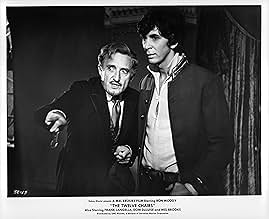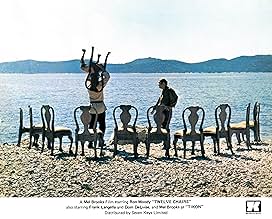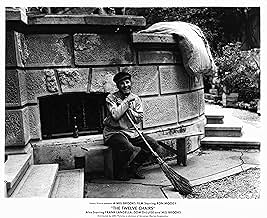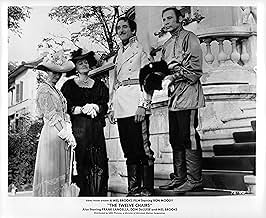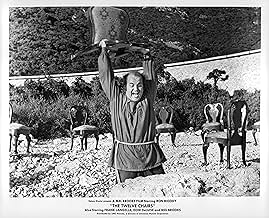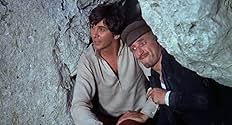NOTE IMDb
6,4/10
7,3 k
MA NOTE
Ajouter une intrigue dans votre langueIn 1920s Soviet Russia, a fallen aristocrat, a priest and a con artist search for a treasure of jewels hidden inside one of twelve dining chairs, lost during the revolution.In 1920s Soviet Russia, a fallen aristocrat, a priest and a con artist search for a treasure of jewels hidden inside one of twelve dining chairs, lost during the revolution.In 1920s Soviet Russia, a fallen aristocrat, a priest and a con artist search for a treasure of jewels hidden inside one of twelve dining chairs, lost during the revolution.
- Récompenses
- 1 victoire et 1 nomination au total
Andréas Voutsinas
- Nikolai Sestrin
- (as Andreas Voutsinas)
Mladen 'Mladja' Veselinovic
- Peasant
- (as Mladja Veselinovic)
Petar Banicevic
- Sergeant
- (non crédité)
Dejan Cavic
- Orator
- (non crédité)
Histoire
Le saviez-vous
- AnecdotesMel Brooks had problems with Yugoslavian extras who didn't speak English. In one scene, extras playing museum guards were supposed to walk through a museum, ringing hand bells and shouting, "Closing time! Closing time!" Instead, the extras misunderstood and shouted, "Cloakie Bye! Cloakie Bye!" Brooks decided "Cloakie Bye" was funnier, so he left it in the movie.
- GaffesDuring the chase through the train yard, a modern era bus can be seen passing in the background.
- Citations
Ostap Bender: [after yet another failure] Remember the famous Russian proverb: "The hungrier you get, the tastier the meal." On the other hand, the French have a proverb: merde!
- Crédits fousIn the opening credits the title of the movie is showed in Russian first (even with a typographic error 'Dvenadzat' stchlyev'), then it changes into the english title. The same happened at the end of the credits with the words "The end" (Konez), first cames the Russian word, than the english translation.
- ConnexionsFeatured in Sneak Previews: Take 2: Who's Funnier: Mel Brooks or Woody Allen? (1980)
- Bandes originalesHope for the Best, Expect the Worst
Music by Johannes Brahms ("Hungarian Dance No. 4 in F# minor") and lyrics by Mel Brooks
Commentaire à la une
It is the forgotten Brooks movie. Probably because it has the most controlled script story, and had the least wild, satyric inventiveness of any of his films.
After he wrote and directed the original THE PRODUCERS, Brooks did not do another film for a few years. The second one was this one set in the post-Russian Revolution period in the Soviet Union. Ron Moody (Fagin in the musical OLIVER) is a minor Tsarist nobleman who discovers, when attending his mother-in-law on her death bed, that she hid her fortune in jewelry in one of the dining room chairs. There were a set of twelve chairs, and they were appropriated by the government to be given to deserving members of the proletariat. Moody discovers that his mother-in-law did confess this to one person besides him: the local Russian Orthodox Priest (Dom DeLuise). Moody finds the latter a difficult opponent to beat to the fortune first. By chance he falls in with a young swindler (Frank Langella) and he and Langella pursue the chairs, and also send DeLuise on a wild goose chase following a second set of similar chairs.
What we get is a view of the Soviet Union in 1928, as the Civil Wars died out and the regime consolidated power. Trotsky's name is now dismissed (as a street shows). The stage is dominated by the state oriented drama that is anti-capitalist. Witness the performance of Andreas Voutsinas - the original "Carmen Ghia" in the first PRODUCERS, as the government backed manager of the theater group that Moody and Langella join. There is a life and death threat behind comments he gives to one of the stage crew he controls. We also see how the common people try to cope with the changes - being sent across country on government sponsored jobs - to houses that the government may furnish.
Brooks has his first role in his own films in this one - as Tikhon, the drunken, ex-servant of Moody. He receives a slap from the latter, and considers it exactly like a hug.
Like IT'S A MAD, MAD, MAD, MAD WORLD, THE TWELVE CHAIRS looks at the antics people will go through for hidden wealth. Langella, who is a street criminal anyway, is the only sane member of the three treasure seekers. He is a realist (the first really serious one in Brooks' films), and has adapted to the new conditions fairly easily by living on his considerably keen wits. He realizes that he is hampered as well as helped by his alliance with Moody, but manages to figure out how to live with Moody as best as possible. Moody has become a bureaucrat to survive in the new regime (he's suspect as an aristocrat), but he still has his pretenses. It takes the events he shares with Langella for him to finally give up his pretenses. Together both men find out what is really worthwhile about living. DeLuise is less lucky. He just discovers the perils of being a loner.
After he wrote and directed the original THE PRODUCERS, Brooks did not do another film for a few years. The second one was this one set in the post-Russian Revolution period in the Soviet Union. Ron Moody (Fagin in the musical OLIVER) is a minor Tsarist nobleman who discovers, when attending his mother-in-law on her death bed, that she hid her fortune in jewelry in one of the dining room chairs. There were a set of twelve chairs, and they were appropriated by the government to be given to deserving members of the proletariat. Moody discovers that his mother-in-law did confess this to one person besides him: the local Russian Orthodox Priest (Dom DeLuise). Moody finds the latter a difficult opponent to beat to the fortune first. By chance he falls in with a young swindler (Frank Langella) and he and Langella pursue the chairs, and also send DeLuise on a wild goose chase following a second set of similar chairs.
What we get is a view of the Soviet Union in 1928, as the Civil Wars died out and the regime consolidated power. Trotsky's name is now dismissed (as a street shows). The stage is dominated by the state oriented drama that is anti-capitalist. Witness the performance of Andreas Voutsinas - the original "Carmen Ghia" in the first PRODUCERS, as the government backed manager of the theater group that Moody and Langella join. There is a life and death threat behind comments he gives to one of the stage crew he controls. We also see how the common people try to cope with the changes - being sent across country on government sponsored jobs - to houses that the government may furnish.
Brooks has his first role in his own films in this one - as Tikhon, the drunken, ex-servant of Moody. He receives a slap from the latter, and considers it exactly like a hug.
Like IT'S A MAD, MAD, MAD, MAD WORLD, THE TWELVE CHAIRS looks at the antics people will go through for hidden wealth. Langella, who is a street criminal anyway, is the only sane member of the three treasure seekers. He is a realist (the first really serious one in Brooks' films), and has adapted to the new conditions fairly easily by living on his considerably keen wits. He realizes that he is hampered as well as helped by his alliance with Moody, but manages to figure out how to live with Moody as best as possible. Moody has become a bureaucrat to survive in the new regime (he's suspect as an aristocrat), but he still has his pretenses. It takes the events he shares with Langella for him to finally give up his pretenses. Together both men find out what is really worthwhile about living. DeLuise is less lucky. He just discovers the perils of being a loner.
- theowinthrop
- 2 août 2006
- Permalien
Meilleurs choix
Connectez-vous pour évaluer et suivre la liste de favoris afin de recevoir des recommandations personnalisées
- How long is The Twelve Chairs?Alimenté par Alexa
Détails
Box-office
- Montant brut aux États-Unis et au Canada
- 1 806 258 $US
Contribuer à cette page
Suggérer une modification ou ajouter du contenu manquant

Lacune principale
By what name was Le mystère des douze chaises (1970) officially released in India in English?
Répondre

